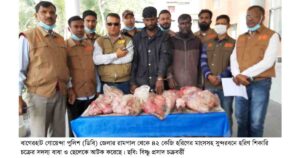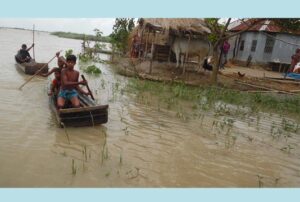More than 30,000 poor and slum households are enjoying sanitation facilities by dint of commissioning of 11,000 hygienic latrines in the metropolis.Similarly, they are getting facilities of safe drinking water from 2,300 tubewells installed in the slum areas besides different other settlement improvement privileges like footpath and drains.Various other settlement improvement facilities like one community
latrine, 42,412 squire-kilometer footpath, 6,708 meter drain, 34 dustbins and seven community centers were developed for ensuring improved water and sanitation among the poverty-prone communities.The access to improved water sources makes the lives of community members healthier while the constructed toilets and bathing facilities leads to improved hygiene practices and the footpaths improves settlement accessibility and mobility.Ajahar Ali, chief executive officer of Rajshahi City Corporation (RCC), said the infrastructural and settlement improvement activities were executed by the direct supervision and monitoring by 173 Community Development Committees under Urban Partnership for Poverty Reduction Project (UPPRP).Local Government Engineering Department has been implementing the project in association with UNDP and financial and technical supports from UKaid and UNHabitat.According to the officials concerned, main thrust of the project is to improve the living and livelihood condition of around two and half lakh poor and extreme poor people, especially women and girls, in the city.Under the project, the beneficiary communities identify and priorities the environmental, social and economic challenges they face as well as the required actions to address them, said Engineer Nur Islam, Town Member Secretary of UPPRP.The slum households have also come together in an anti- poverty savings scheme to raise more than Taka 9.5 crore. Through the savings and credit programmes, the communities now can operate their own savings schemes and create a revolving fund from which credit operations are being managed by themselves.The programme promotes household and community level urban food production technology demonstrations, provides small input supports especially high yielding variety vegetable and fruit seeds, saplings, ducklings, chick and poultry vaccination.It also provides business start-up grants to extreme poor women for poultry, goat rearing, beef fattening and agri-business allowing them to have access to regular income.Besides, the ongoing apprenticeships and vocational training improve the odds of youth landing decent jobs and regular income.Rapid urbanisation in the city is a growing trend that creates various challenges particularly inadequacy of infrastructural services, basic amenities, violence and socio-economic insecurity like other parts of the country, said Ajahar Ali. He, however, said the community savings and credit activities have been adjudged as an effective means of addressing some of the challenges.The approach is good for alleviating urban poverty alongside women empowerment as many other slum communities intend to adopt the process after witnessing its overall successes.The successful trend will continue even after completions of the project that will help the poor and extreme poor people bring about change within their families and communities, he expects. BSS, Rajshahi




